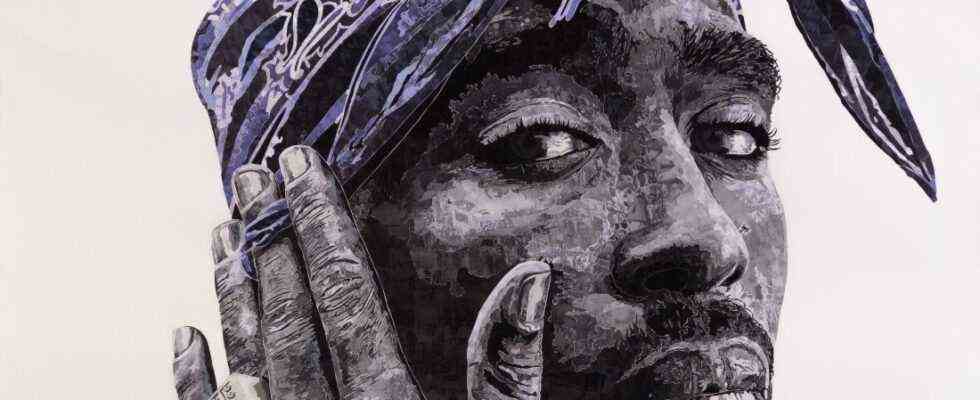It is not a moving image, as one might consider typical of Marcel Odenbach, the pioneer of German video art. At first glance, it’s a pretty conventional portrait, albeit a famous one: Tupac Shakur, an African-American rapper shot in Las Vegas in 1996, who places the middle finger of his left hand on his right temple and slides it through a loop of the bandana around his head is looped. The template is a photo of the Dutchwoman Diana Lixenberg, which has a similar recognition value as the Che Guevara portrait that was ubiquitous in the past. Odenbach has enlarged it to two and a half times one and a half meters.
If you step closer, you can see that the face and hand are collaged from snippets of documentary images from the time of the American civil rights movement and the Black Panther Party. The shirt, on the other hand, is made up of scenes from the animated series “Beavis and Butthead”. Marcel Odenbach combines photos of the struggle for black civil rights with the epitome of white trash mindlessness in the 1990s, as well as a show that ran on MTV, the broadcaster that ran the pop mainstream of the time, in the image of the rapper, long since transfigured into a pop icon pictured. One can read this as an illustration of the gaping division in American society, which is now wider than ever, as a portent of a development that culminated in the Black Lives Matter movement, among other things.
Odenbach is currently experiencing his moment: He can be seen at the same time in Munich, Krefeld, the Cologne Museum and Düsseldorf
Marcel Odenbach, who recently received the Wolfgang Hahn Prize at the Museum Ludwig, studied architecture and art history as well as semiotics in the 1970s. He got to know the camera as a documentation tool during his studies and used it more and more as an independent aesthetic and conceptual medium in the midst of the burgeoning video art scene. As far as semiotics is concerned, finding and interpreting signs in his art is actually the greatest challenge, but often also the greatest pleasure. Odenbach is currently experiencing his moment: He can be seen in Munich as well as in Krefeld, and he is exhibiting his series “Patterns” in the Ludwig Museum in Cologne. The biggest show, however, is the retrospective that the Kunstsammlung NRW has dedicated to the 68-year-old who has just been professor for film and video at the Düsseldorf Art Academy.
Marcel Odenbach’s “The Large Window, Insight from a View” from 2001 is a video installation.
(Photo: VG Bild-Kunst, Bonn 2021)
It bears the title “One way or another”, and you can actually look at all of his works one way or the other, i.e. from different perspectives. The scope for interpretation remains large, although the subject is always well outlined. The preoccupation with the colonial heritage of Europe and the consequences of the colonial era on the African continent, for example, a much discussed topic today, began decades ago for Odenbach, with video works such as “Standing is not falling over” from 1989. Scenes from Namibia’s struggle for independence between 1960 and 1989 are mixed with pictures of Odenbach himself cutting his hair and pictures of the bloody suppression of the demonstration at Tiananmen Square in Beijing in 1989. With Marcel Odenbach, the biographical reference is often just as crucial as the historical one and includes the viewer.
In the course of viewing these works, one gets more and more from separating static collages and films. They are all cut together. There’s a newspaper page from the day after the Paris terrorist attacks on the satirical magazine’s office Charlie Hebdowhich in turn is composed of tiny, ambiguous newspaper images. But there is also the film “Proof to Nothing” (2016), in which Odenbach’s camera scans the memorial at the memorial in the former concentration camp, but never shows it in full. The heroic, even totalitarian gesture of this group of figures, which was repeatedly revised at the behest of the GDR regime, is thus fragmented and subverted.
The Odenbach retrospective in Düsseldorf is presenting a multi-layered, in the best sense of the word, small-scale artist – multi-faceted, ironic, subjective. A congenially curated show at the right time.
Marcel Odenbach – Either way in the Art collection NRW, K21, Düsseldorf, until 9.1.22. The catalog costs 39 euros.

